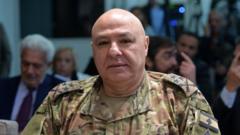In the wake of years of political deadlock, Lebanon’s parliament has elected Joseph Aoun, the commander of the Lebanese army, as the new president. His presidency comes at a time when the country faces multifaceted crises and after a lengthy vacancy since 2022.
Army Chief Joseph Aoun Elected President of Lebanon, Ending Years of Deadlock

Army Chief Joseph Aoun Elected President of Lebanon, Ending Years of Deadlock
Joseph Aoun’s election marks a turning point for Lebanon, concluding a prolonged leadership vacuum and addressing pressing national challenges.
Lebanon's parliament convened to elect Joseph Aoun as its new president, finally breaking a deadlock that has persisted for over two years. The 60-year-old military veteran has commanded the Lebanese army since 2017 and is recognized for his experience during times of turmoil, including the conflict with Israel and an ongoing economic depression. His candidacy derived significant backing from various political factions, including endorsements from influential nations like the United States, France, and Saudi Arabia.
The election process was fraught with uncertainty. Previously, the parliament had failed to elect a president on multiple occasions, even before the expiration of the term of former president Michel Aoun in October 2022. Amidst this backdrop, a rival candidate backed by Hezbollah withdrew to support Aoun, clearing a path for his election.
The presidential role in Lebanon is primarily ceremonial, navigating a complex power-sharing structure that allocates positions along sectarian lines. The election occurred shortly after a ceasefire agreement was reached following a brutal conflict between Hezbollah and Israel, which has placed the Lebanese army in a pivotal role in maintaining peace in the region. Deployments in southern Lebanon are critical to resolving tensions, especially ahead of a deadline for Hezbollah's disarmament.
During Aoun's tenure, the army withheld direct involvement in conflicts while also managing the aftermath of the 2020 Beirut port explosion, which resulted in a significant loss of life and added strain to the country's struggles. His leadership is seen as essential, especially given Lebanon's fractured governance and significant social unrest directly tied to economic hardships.
In the parliamentary election, Aoun initially fell short of the requirement for a two-thirds majority but ultimately secured 99 votes in a subsequent round, easily surpassing the necessary threshold. His election, as reported by various news outlets, prompted celebrations across the country, reflecting a collective sigh of relief among factions eager for stability.
As Aoun prepares to navigate his new role, the focus will be on re-establishing governmental functions that have languished and addressing the multifaceted crises facing Lebanon, including deep-seated economic challenges and internal political divisions.
The election process was fraught with uncertainty. Previously, the parliament had failed to elect a president on multiple occasions, even before the expiration of the term of former president Michel Aoun in October 2022. Amidst this backdrop, a rival candidate backed by Hezbollah withdrew to support Aoun, clearing a path for his election.
The presidential role in Lebanon is primarily ceremonial, navigating a complex power-sharing structure that allocates positions along sectarian lines. The election occurred shortly after a ceasefire agreement was reached following a brutal conflict between Hezbollah and Israel, which has placed the Lebanese army in a pivotal role in maintaining peace in the region. Deployments in southern Lebanon are critical to resolving tensions, especially ahead of a deadline for Hezbollah's disarmament.
During Aoun's tenure, the army withheld direct involvement in conflicts while also managing the aftermath of the 2020 Beirut port explosion, which resulted in a significant loss of life and added strain to the country's struggles. His leadership is seen as essential, especially given Lebanon's fractured governance and significant social unrest directly tied to economic hardships.
In the parliamentary election, Aoun initially fell short of the requirement for a two-thirds majority but ultimately secured 99 votes in a subsequent round, easily surpassing the necessary threshold. His election, as reported by various news outlets, prompted celebrations across the country, reflecting a collective sigh of relief among factions eager for stability.
As Aoun prepares to navigate his new role, the focus will be on re-establishing governmental functions that have languished and addressing the multifaceted crises facing Lebanon, including deep-seated economic challenges and internal political divisions.





















